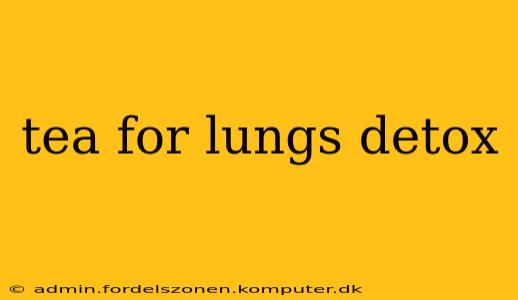The idea of a "lung detox" is appealing, especially for smokers or those living in polluted areas. While the term "detox" itself is often misused and lacks strong scientific backing, certain herbal teas may offer benefits that support respiratory health. This article explores the potential of various teas to aid lung function and address common concerns. We'll also delve into what science actually says about "detoxing" your lungs and explore healthier ways to support your respiratory system.
What is a Lung Detox?
The term "lung detox" often evokes images of magically cleansing the lungs of all toxins. However, the lungs have their own natural detoxification system. The tiny hair-like structures called cilia constantly sweep mucus and trapped particles (including toxins) upwards towards the throat, where they are either swallowed or coughed out. This process is vital for maintaining clean airways. So, rather than a "detox," it's more accurate to talk about supporting your lungs' natural cleansing mechanisms and improving overall respiratory health.
Can Tea Help Cleanse Your Lungs?
While tea can't magically "cleanse" your lungs, some herbal teas contain compounds with potential benefits for respiratory health. These benefits are usually related to reducing inflammation, acting as an expectorant (helping to loosen mucus), or providing antioxidants that combat oxidative stress. It's crucial to remember that these teas are supportive measures and not a replacement for medical treatment.
What Teas Might Support Lung Health?
Several teas are frequently associated with respiratory support:
-
Licorice Root Tea: Contains compounds with anti-inflammatory properties, potentially helpful for soothing irritated airways. However, excessive consumption of licorice root can have side effects, so moderation is key.
-
Ginger Tea: Known for its anti-inflammatory and expectorant properties, ginger tea may help loosen congestion and soothe irritated throats.
-
Eucalyptus Tea: Eucalyptus oil is often used in vapor rubs for its decongestant properties. Eucalyptus tea might offer similar benefits, but should be used cautiously as it can interact with certain medications.
-
Peppermint Tea: Peppermint's soothing properties can help relieve coughs and soothe irritated airways. Its menthol content can create a cooling sensation, providing temporary relief from congestion.
-
Thyme Tea: Contains thymol, a compound with potential antibacterial and expectorant properties. It might be beneficial for relieving coughs associated with respiratory infections.
-
Green Tea: Rich in antioxidants, green tea may help combat oxidative stress, potentially protecting lung cells from damage.
Does Drinking Tea Help With Smoking Cessation?
Quitting smoking is the most effective way to improve lung health after prolonged exposure to cigarette smoke. While tea can't replace professional support or medication for smoking cessation, certain teas might aid in managing withdrawal symptoms like cravings and stress, potentially making the process easier. However, this is not a substitute for professional help. Consult your doctor or a smoking cessation program for effective strategies.
What are Other Ways to Support Lung Health?
Beyond herbal teas, several lifestyle changes can significantly improve lung health:
-
Quit Smoking: This is paramount for improving lung function and reducing the risk of respiratory diseases.
-
Avoid Air Pollution: Minimize exposure to pollutants by staying indoors on high-pollution days or using an air purifier.
-
Practice Regular Exercise: Physical activity improves lung capacity and overall cardiovascular health.
-
Maintain a Healthy Diet: A balanced diet rich in fruits and vegetables provides essential nutrients for overall health, including respiratory function.
-
Manage Stress: Chronic stress can negatively impact respiratory health. Practice relaxation techniques like yoga or meditation.
Can Herbal Teas Replace Medical Treatment for Lung Conditions?
No. Herbal teas can offer supportive benefits for lung health, but they are not a replacement for medical treatment for lung conditions like asthma, bronchitis, or COPD. Always consult a healthcare professional for diagnosis and treatment of any respiratory issue. Self-treating can be dangerous and delay appropriate medical care.
Conclusion
While the notion of a "lung detox" is largely a marketing concept, supporting your lungs' natural cleansing mechanisms through lifestyle changes and potentially incorporating certain herbal teas can contribute to better respiratory health. However, remember that these teas are complementary therapies, not cures. Prioritizing smoking cessation, avoiding pollutants, and adopting a healthy lifestyle remain the most effective strategies for long-term lung health. Always consult your physician before using herbal remedies, especially if you have pre-existing medical conditions or are taking other medications.
